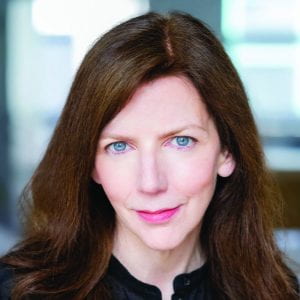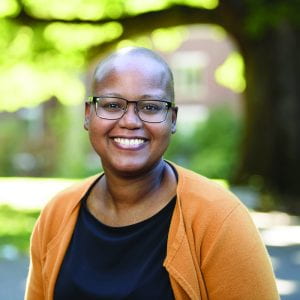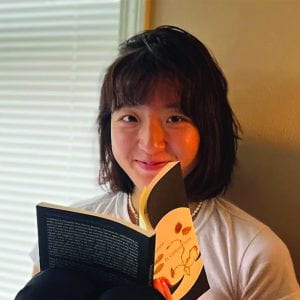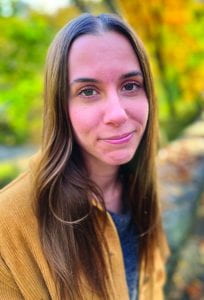Andrea Bianchi (MFA+MA Student)
 As I study creative nonfiction in my second year of the Litowitz program and begin my final projects that will mark the program’s end, my writing is paradoxically focused on questions of endlessness.
As I study creative nonfiction in my second year of the Litowitz program and begin my final projects that will mark the program’s end, my writing is paradoxically focused on questions of endlessness.
My nonfiction is committed to engaging with vulnerable personal topics—including chronic disease, mental illness, and abusive relationships—yet such experiences and their aftereffects often offer no resolution. Through my creative work and my intended MA capstone project, I am exploring how non-linear structures or fragmented forms can still reach toward understanding and insight even when life provides no coherent narrative arc or satisfactory closure. I recently investigated this tension in my lyric essay “A Still Life,” which is forthcoming in Hunger Mountain. The piece details living with the stigma of an incurable infection, finding solace in art, and recognizing beauty in circumstances that may never change.
Beyond nonfiction, my writing also contemplates the question of endlessness through other genres. In a current fiction workshop, I am reevaluating chronic illness from a third-person perspective. I have also been reconsidering this topic through the condensed language of prose poetry, and I further explored the connection between poetry and prose during this summer’s Bread Loaf Writers’ Conference, which I attended through support from the Northwestern Graduate School and English Department.
Also this summer, I began research for my MFA thesis project, a memoir that intends to recount my homeschooled childhood, including the accompanying religious extremism, mental illness, and isolation. My research has included reviewing my personal archive of childhood diaries and K–12 homeschool curriculum, as well as completing a course on the sociology of the family during my first year in the Litowitz program. Through this and other seminars, I am examining the social context of my family dynamics as I write about its endless aftereffects.
Aaron Greenberg (PhD 2017)
 After completing my PhD in English at Northwestern in 2017, I founded the writing and publishing company Biograph. While writing, designing, and publishing dozens of custom books for clients, we scaled our expertise with the Biograph app, which as The Daily Northwestern reports, is making storytelling more accessible. Since 2019, I’ve been teaching seminars at the School of the Art Institute of Chicago including “The Art of Life Writing,” “(Still) Life Writing,” “Generative Art: The Futures of Creativity,” “Lost and Found Arts,” and “Art in the Age of Crypto.” I’ve also taught seminars on a range of topics including life writing at Newberry Library, and just joined the faculty at Lake Forest College.
After completing my PhD in English at Northwestern in 2017, I founded the writing and publishing company Biograph. While writing, designing, and publishing dozens of custom books for clients, we scaled our expertise with the Biograph app, which as The Daily Northwestern reports, is making storytelling more accessible. Since 2019, I’ve been teaching seminars at the School of the Art Institute of Chicago including “The Art of Life Writing,” “(Still) Life Writing,” “Generative Art: The Futures of Creativity,” “Lost and Found Arts,” and “Art in the Age of Crypto.” I’ve also taught seminars on a range of topics including life writing at Newberry Library, and just joined the faculty at Lake Forest College.
My academic research and practice are rooted in life writing, (auto)biographical acts intertwining daily “arts of living” (ars vivendi) with existential considerations: What are the historical and contemporary meanings of life? How do folks make meaning from their lives? How is meaning-making an essential skill for both survival and living well? How do the ways in which cultures and states define “life” enact what they describe? My work celebrates humanity while questioning the anthropogenic decisions that institute sociopolitical orders through (de)humanization. Recent publications include “Escape to Impersonality: Personas in H.G. Wells’ Experiment in Autobiography” in Persona Studies; Amparo Garcia Crow, Prophecy of My Undoing, ed. Aaron Greenberg (Biograph, forthcoming 2024); and Disrupted Lives: Stories from Child Survivors of the Holocaust, a project of the Illinois Holocaust Museum and Education Center in association with Biograph LLC (Kar-Ben Publishing, forthcoming 2024).
My story is being featured in the upcoming winter issue of Northwestern Magazine for the unpredictable directions in which I am taking my training from the English Department.
Suzanne Scanlon (MFA+MA 2023)
 I spent the third, glorious gift of a year in the Litowitz creative writing program writing and revising and rewriting and editing my memoir. I could not have written this book in 1.5 years without the support of this program. Committed: On Meaning and Madwomen will be published by Vintage in April 2024. My other works in progress include a novel, “Without You I’m Nothing,” and “The Book of Walks,” a long essay structured around walking and artmaking.
I spent the third, glorious gift of a year in the Litowitz creative writing program writing and revising and rewriting and editing my memoir. I could not have written this book in 1.5 years without the support of this program. Committed: On Meaning and Madwomen will be published by Vintage in April 2024. My other works in progress include a novel, “Without You I’m Nothing,” and “The Book of Walks,” a long essay structured around walking and artmaking.
Since graduating, I’ve been teaching in the Writing program at the School of the Art Institute and as an Artist-in-Residence here at Northwestern. My essay “The Moving Target of Being” was selected as a Notable essay in the The Best American Essays 2023. Two books of mine will be published in Paris in March 2024 from Les Editions du Portrait; it’s been a joy to work with Marie Chuvin and Laure Jouanneau-Lopez on the French translations. The UK edition of Committed will appear in April 2024 and other translations are forthcoming.
An excerpt from Committed, titled “Without Care,” will be published in BOMB Magazine next December. This was a brief chapter I wrote in response to feedback from Chris Lombardo (MFA+MA 2023), Matthew Richardson (MFA+MA 2022), and Professor Sarah Schulman in our manuscript development workshop, who very helpfully suggested that, given that the book is very much a story of disequilibrium, I should write an early scene of equilibrium. I followed their prompt and the resulting section became key to structuring the book’s trajectory.
I am grateful to the Litowitz family and the department for the gift of the past three years, my great good luck to work with so many inspiring faculty members and students. I’m still actively looking for a full-time/tenure-track job, but we’ll see. For now, I’m making it work, as artists do, in more ways than one.
Simone Waller (PhD 2019)
 I am grateful that I was able to explore the full range of my interests as a teacher and scholar during my time at Northwestern and beyond. I have been lucky to teach in a variety of contexts—arts and humanities nonprofits based in local communities, private universities, and a small liberal arts college. Working with and learning from mentors between campuses, across Chicagoland, and through the pandemic helped me understand that good teaching is versatile and meets students where they are.
I am grateful that I was able to explore the full range of my interests as a teacher and scholar during my time at Northwestern and beyond. I have been lucky to teach in a variety of contexts—arts and humanities nonprofits based in local communities, private universities, and a small liberal arts college. Working with and learning from mentors between campuses, across Chicagoland, and through the pandemic helped me understand that good teaching is versatile and meets students where they are.
I research sixteenth-century humanists’ attempts to do just that, using the material features of print and theater to innovate literary forms that taught ordinary people to see themselves as part of public conversations on the most pressing issues of their day. My work aims to help students recover the urgency in texts that may otherwise feel remote, and to carry what they learn from those old books into their new lives and vocations.
Yasmin Jiesoo Yoon (PhD student)
 I came to Northwestern’s English PhD program in 2021 with the intention of researching the “Asian Century,” a time and place that supposedly eclipses U.S. hegemony, alongside new materialism, affect theory, and feminist thought. In preparation for my qualifying exam, I’ve continued to be interested in the “Asian Century,” but feel as though I have many more tools to think about its construction. During my first two years of coursework, I was able to learn about and test out new and previously unfamiliar critical methodologies, such as historical materialism and psychoanalysis, as well as take interest in topics and periods that seemed at first unrelated to the “Asian Century.” Towards the end of my first year, I was able to present on a panel at 2022 Asian American Studies Conference, held that year in Denver, CO. The experience was especially meaningful, as I was able to meet other young scholars of Asian American Studies and got to observe first-hand the dynamic conversations happening in the field. To return to my initial interest in the “Asian Century” after two years of coursework has been thus exciting, and I feel that I am returning to the topic with a fresh pair of eyes.
I came to Northwestern’s English PhD program in 2021 with the intention of researching the “Asian Century,” a time and place that supposedly eclipses U.S. hegemony, alongside new materialism, affect theory, and feminist thought. In preparation for my qualifying exam, I’ve continued to be interested in the “Asian Century,” but feel as though I have many more tools to think about its construction. During my first two years of coursework, I was able to learn about and test out new and previously unfamiliar critical methodologies, such as historical materialism and psychoanalysis, as well as take interest in topics and periods that seemed at first unrelated to the “Asian Century.” Towards the end of my first year, I was able to present on a panel at 2022 Asian American Studies Conference, held that year in Denver, CO. The experience was especially meaningful, as I was able to meet other young scholars of Asian American Studies and got to observe first-hand the dynamic conversations happening in the field. To return to my initial interest in the “Asian Century” after two years of coursework has been thus exciting, and I feel that I am returning to the topic with a fresh pair of eyes.
Anna Zalokostas (PhD student)
 Despite being on the job market—a canonically terrible period of anyone’s life—I’m still excited by and interested in my dissertation project. Analyzing globalization as a keyword of the 1990s, “Object Lessons: Free Trade, Race, and the Literature of Globalization” brings together a group of Black, Asian American, and Latinx writers as critical commentators on free trade imperialism. Though writers including Harryette Mullen, Karen Tei Yamashita, Francisco Goldman, and Juan Felipe Herrera are often celebrated as representatives of an ascendant U.S. multiculturalism, I argue that this label obscures a shared concern with how race is discursively and materially entangled with the fast flow of retail commodities across global space. Working across genre and other accustomed literary categories, I contextualize their novels and poems within the U.S. print and public culture’s contemporaneous interest in plumbing the depths of transnational commodity chains.
Despite being on the job market—a canonically terrible period of anyone’s life—I’m still excited by and interested in my dissertation project. Analyzing globalization as a keyword of the 1990s, “Object Lessons: Free Trade, Race, and the Literature of Globalization” brings together a group of Black, Asian American, and Latinx writers as critical commentators on free trade imperialism. Though writers including Harryette Mullen, Karen Tei Yamashita, Francisco Goldman, and Juan Felipe Herrera are often celebrated as representatives of an ascendant U.S. multiculturalism, I argue that this label obscures a shared concern with how race is discursively and materially entangled with the fast flow of retail commodities across global space. Working across genre and other accustomed literary categories, I contextualize their novels and poems within the U.S. print and public culture’s contemporaneous interest in plumbing the depths of transnational commodity chains.
Drawn from my first chapter, my very first peer-reviewed article, “Generic Life: Mass Consumption and Globalization in Harryette Mullen’s S*PeRM**K*T,” appeared last year in Post45. I’m proud of it—and still even like it, at least most of the time. Reading Mullen’s supermarket poems alongside microeconomic histories of shopping, retailing, and advertising, I show how Mullen uses lyric forms of listing, canting, and riddling to redraw the link between the commodity form, racial form, and poetic form. Though I’m already bracing myself to be overwhelmed by MLA, I’m truly excited to be on a panel (with Kalyan Nadiminti!) about cultural production and leftist movements, where I’ll talk about the anti-globalization movement and literary fictions of trade policy. In the meantime, I’m trying to finish revising another article, “What Was Globalization? The Long Downturn at the End of History,” which is forthcoming in a special issue of Mediations. It’s still hard to believe I even had a first!
Though I have moved out of the Chicagoland area, I’ll be returning in the winter to teach my fifth class as instructor of record, a first-year seminar on the 1990s. I’m most looking forward to resuming in-person study halls with the Northwestern Prison Education Program (NPEP), which I’ve been involved with since 2019, and which has been one of the most rewarding endeavors I’ve undertaken as an educator.